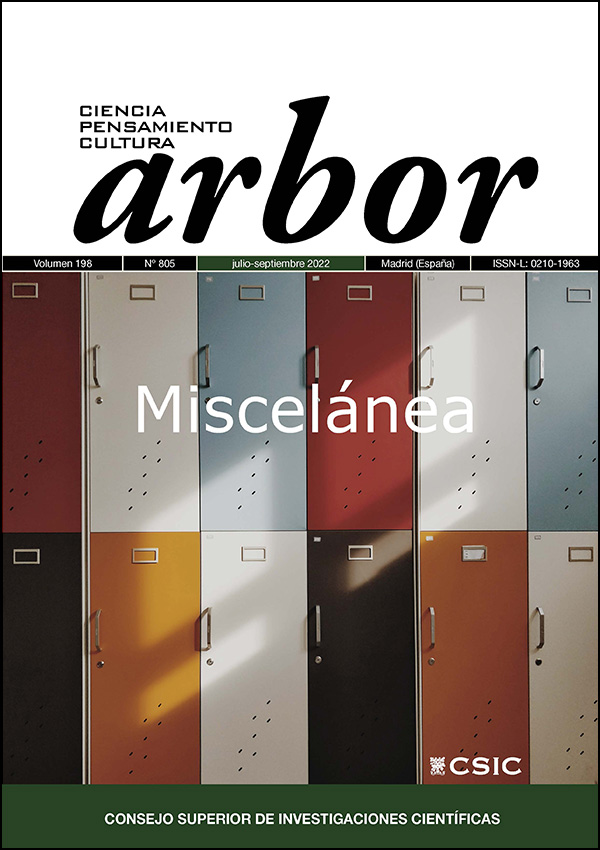Scientific capacities and experimental systems: an operative proposal on the role of scientists in the context of knowledge production
DOI:
https://doi.org/10.3989/arbor.2023.809003Keywords:
Production of scientific knowledge, experimental systems, operative capacities, experientiality, differential reproductionAbstract
In current studies on the production of scientific knowledge, there is a predominant tendency to analyze the production of scientific knowledge through its relational structure, leaving analysis of the capacities of the scientists who influence the research processes in the background. In this paper, we argue in favor of a different direction. Specifically, we argue that scientists and their capacities -understood operationally- are an indispensable condition for the production of knowledge.
In order to defend this position, we will first present two theories representative of this tendency and then show their limitations when it comes to analyzing the relationships and networks that make it possible to produce knowledge and to study the results of these relationships, but which are incapable of explaining the role played by scientists and their capacities within this.
Secondly, given this situation, we propose an operational characterization of scientists and their capacities in the production of scientific knowledge. This characterization will be developed on the basis of Rheinberger’s theory of experimental systems. Based on this, we will propose our own interpretation of some of Rheinberger’s references to scientific capacities and their specific relationship with experimental systems. This interpretation highlights how non-thematic operations and knowledge affect the recognition of anomalies and enable concrete interventions in the experimental system, thus enabling the production of knowledge.
Downloads
References
Barad, Karen (1998). Agential Realism: Feminist Interventions in Understanding Scientific Practices. En Mario Biagioli (ed.) The Science Studies Reader (pp. 1-11). NY: Routledge Press.
Barad, Karen (2003). Posthumanist Performativity: Toward an Understanding of How Matter Comes to Matter. Signs: Journal of Women in Culture and Society, 28 (3), 801-831. https://doi.org/10.1086/345321
Derrida, Jacques (1994). Firma, acontecimiento y contexto. En Márgenes de la filosofía (pp.351-369). Carmen Gonzalez Marín trad. Madrid: Cátedra.
Enns, Anthony (2015). The Media Philosophy of Sybille Krämer. En: Sybille Krämer (ed.). Medium Messenger, Transmission. An Approach to Media Philosophy (pp.9-18). Amsterdam: Amsterdam University Press. https://doi.org/10.1515/9789048524990-002
Fleck, Ludwik (2012). Entstehung und Entwicklung einer wissenschaftlichen Tatsache: Einführung in die Lehre vom Denkstil und Denkkollektiv (L. Schäfer & T. Schnelle, Hrsg, 12 Auflage). Frankfurt: Suhrkamp.
Knorr Cetina, Karin (1992). The couch, the cathedral, and the laboratory: on the relationship between experiment and laboratory in science. Andrew Pickering (ed.), Science as practice and culture (pp. 113-138). Chicago: University of Chicago Press.
Knorr Cetina, Karin (1995). Laboratory Studies: The Cultural Approach to the Study of Science. En Sheila Jasanoff (ed.), Handbook of science and technology studies (pp. 140-166). Los Angeles: Sage Publ. https://doi.org/10.4135/9781412990127.n7
Krämer, Sybille (2016). Figuration, Anschauung, Erkenntnis. Grundlinien einer Diagrammatologie. Frankfurt: Suhrkamp.
Latour, Bruno (2004). How to Talk About the Body? The Normative Dimension of Science Studies. Body & Society, 10(2-3), pp. 205-229. https://doi.org/10.1177/1357034X04042943 https://doi.org/10.1177/1357034X04042943
Latour, Bruno (1986). Visualisation and Cognition: Drawing Things Together. En Henrika Kuklick y Elizabeth Long (ed.) Knowledge and Society Studies in the Sociology of Culture Past and Present (vol. 6, pp. 1-40). JAI Press.
Latour, Bruno y Woolgar, Steve (2013). Laboratory Life. New Jersey: Princeton University Press. https://doi.org/10.2307/j.ctt32bbxc
Polanyi, Michael (2005). Personal knowledge: Towards a post-critical philosophy. Chicago: University of Chicago Press.
Polanyi, Michael (2009). The tacit dimension. Chicago: University of Chicago Press.
Rheinberger, Hans-Jörg (1997). Toward a history of epistemic things. Stanford: Stanford University Press.
Rheinberger, Hans-Jörg (2005a). A Reply to David Bloor: Toward a Sociology of Epistemic Things. Perspectives on Science, 13(3), pp. 406-410. https://doi.org/10.1162/106361405774287973
Rheinberger, Hans-Jörg (2005b). Iterationen. Leipzig: Merve.
Rheinberger, Hans-Jörg (2006). Experimentalsysteme und epistemische Dinge. Frankfurt: Suhrkamp.
Rheinberger, Hans-Jörg (2007). Historische Epistemologie zur Einführung. Hamburg: Junius.
Rheinberger, Hans-Jörg (2018). Experimentalität: Hans-Jörg Rheinberger im Gespräch über Labor, Atelier und Archiv. Berlin: Kulturverlag Kadmos.
Published
How to Cite
Issue
Section
License
Copyright (c) 2023 Consejo Superior de Investigaciones Científicas (CSIC)

This work is licensed under a Creative Commons Attribution 4.0 International License.
© CSIC. Manuscripts published in both the printed and online versions of this Journal are the property of Consejo Superior de Investigaciones Científicas, and quoting this source is a requirement for any partial or full reproduction.All contents of this electronic edition, except where otherwise noted, are distributed under a “Creative Commons Attribution 4.0 International” (CC BY 4.0) License. You may read here the basic information and the legal text of the license. The indication of the CC BY 4.0 License must be expressly stated in this way when necessary.
Self-archiving in repositories, personal webpages or similar, of any version other than the published by the Editor, is not allowed.















